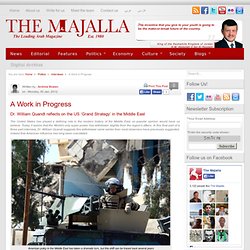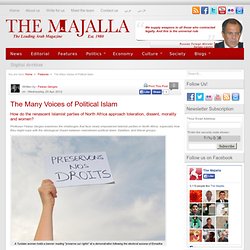

A Work in Progress. Dr.

William Quandt reflects on the US ‘Grand Strategy’ in the Middle East The United States has played a defining role in the modern history of the Middle East, so popular opinion would have us believe. Today it seems that the World's only super-power has withdrawn slightly from the region's affairs. In this final part of a three part interview, Dr. William Quandt suggests this withdrawal came earlier than most observers have previously suggested, indeed that American influence has long been overstated. American policy in the Middle East has taken a dramatic turn, but this shift can be traced back several years William B. Today he is an author, professor and member of the Department of Politics at the University of Virginia and a regular participant in discussions of US policy in the Middle East. To read the first installment of this interview, click here To read the second installment of this interview, please click here Dr. Yes. Where they want to be for the future is more Asia focused.
Don’t Fear a Nuclear Arms Race in the Middle East - By Steven A. Cook. On March 21, Haaretz correspondent Ari Shavit wrote a powerful op-ed in the New York Times that began with this stark and stunning claim: "An Iranian atom bomb will force Saudi Arabia, Turkey, and Egypt to acquire their own atom bombs.

" Indeed, it has become axiomatic among Middle East watchers, nonproliferation experts, Israel's national security establishment, and a wide array of U.S. government officials that Iranian proliferation will lead to a nuclear arms race in the Middle East. President Barack Obama himself, in a speech to the American Israel Public Affairs Committee (AIPAC) last month, said that if Iran went nuclear, it was "almost certain that others in the region would feel compelled to get their own nuclear weapon. " This logic was undoubtedly at work when Pakistan embarked on a nuclear program in 1972 to match India's nuclear development program. But even if the Turks wanted their own bomb, they have almost no capacity to develop nuclear weapons technology. A THEORY OF THE ISLAMIC REVIVAL. The rise of Arab republics? Sharjah, United Arab Emirates - The Arab world has lately been experiencing monumental changes including the realignment of political alliances, but one possible long-term outcome of the Arab uprisings may be a game of musical chairs involving the Arab monarchies, republics and Western powers.

By the end of the next decade it is not unreasonable to predict a stronger relationship between certain Arab republics and the West than that which existed between Arab monarchies and the West over the past few decades. The politically stagnant Arab monarchies are also precipitating this possible realignment as they enact increasingly restrictive political and social laws. Kuwait's parliament, for instance, has recently passed a law that imposes the death penalty on anyone who insults God, Prophet Mohammed or any of his wives on social media. This geo-strategic realignment is not improbable. After all, not all Arab monarchies are wealthy, and not all Arab republics are poor.
The Many Voices of Political Islam. How do the renascent Islamist parties of North Africa approach toleration, dissent, morality and women?

Professor Fawaz Gerges examines the challenges that face newly empowered Islamist parties in North Africa, especially how they might cope with the ideological chasm between mainstream political Islam, Salafism, and liberal groups. A Tunisian woman holds a banner reading "preserve our rights" at a demonstration following the electoral success of Ennadha Since gaining majorities in these countries’ parliaments, mainstream Islamist groups have been forced to outline their stances on a wide range of issues, especially with regards to Islamic law, personal freedoms, women and minority rights, and tourism.
Liberal-minded activists assert that the Muslim Brotherhood (MB), Ennahda Party, Morocco’s Justice and Development Party, and the Salafists exhibit illiberal tendencies and are intolerant of the rights of minorities, particularly women. Toleration and Pluralism? Fawaz Gerges. Gauging Arab public opinion. The first of its kind - a poll conducted in 12 Arab countries, representing 84 per cent of the population of the Arab world, in an attempt to gauge the region's political mood - has arrived at some interesting results.

Organised by the Arab Centre for Research and Policy Studies (ACRPS), face-to-face interviews by Arab surveyors with 16,731 individuals in the first half of 2011 revealed majority support for the goals of the Arab revolutions and notably, for a democratic system of government. Surveillance Inc: How Western Tech Firms Are Helping Arab Dictators - Trevor Timm & Jillian C. York - International.
As democratic movements spread in the Middle East, governments are cracking down, and that means big business for the companies who help them do it.

A computer systems coordinator at Tunisia Television in Tunis / Reuters Reliance means vulnerability, and the activists and citizen journalists of the Arab uprisings rely heavily on the Internet and mobile technology. They use text messaging to coordinate protests, for example, or social media sites to upload the photos and videos that then make it into mainstream global media.